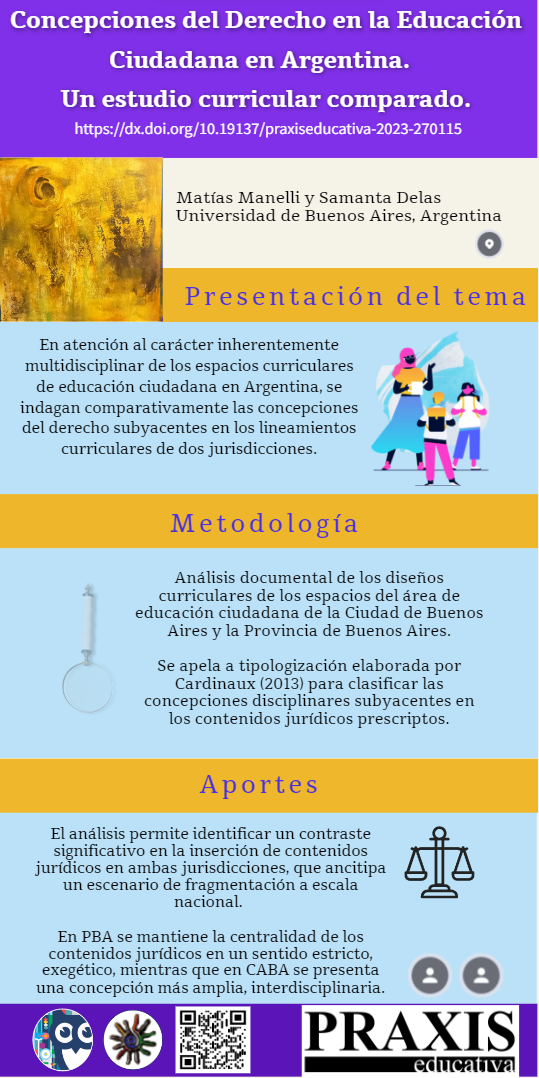Conceptions of Law in Citizenship Education in Argentina. A comparative curricular study
DOI:
https://doi.org/10.19137/praxiseducativa-2023-270115Keywords:
Citizen Education, Law, Secondary Education, CurriculumAbstract
The complexity that citizen education spaces owe to their multidisciplinary nature makes the study of disciplinary conceptions that underlie curricular developments relevant. In this sense, the present work proposes to analyze the curricular definitions on education for citizenship at the secondary level from a comparative study of the jurisdictions of the City of Buenos Aires and the Province of Buenos Aires. In particular, the conceptions of law that underlie the curricular designs of each jurisdiction will be investigated, taking into account the different levels of government of the educational system and the articulation of jurisdictional and national initiatives at the federal level.
Downloads
References
Böhmer, M. (2003). Algunas sugerencias para escapar del silencio del aula. Academia. Revista sobre Enseñanza del Derecho, 1: 13-34.
Bottarini, R. (2013). La educación ciudadana en el vendaval político argentino. En Schujman, G. y Siede, I. (Comps.) Ciudadanía para armar. Aportes para la formación ética y política. Aique.
Cardinaux, N. (2002). La formación jurídica en la enseñanza media en Revista de Sociología del Derecho 21/22 (Noviembre 2001- abril 2002).
Cardinaux, N. (2013). Concepciones del derecho: su impacto sobre los métodos de enseñanza. En: Schujman, G. y Siede, I. (Comps.) Ciudadanía para armar. Aportes para la formación ética y política. Aique.
Davini, M. C. (2008). Métodos de enseñanza. Didáctica general para maestros y profesores. Santillana.
De Alba, A. (2006). Curriculum: crisis, mito y perspectivas, Miño y Dávila Editores.
Dubet F. (2003). Mutaciones cruzadas: ciudadanía y escuela.. En BENEDICTO, J. y M. MORÁN, M. (coord.). Aprendiendo a ser ciudadanos. Instituto de la Juventud.
Dubet, F. (2010). Crisis de la transmisión y el declive de la institución. En: Política y Sociedad. Vol. 47 Nro. 2, Madrid, pp. 12-25.
Fairstein G. (2016). El discurso pedagógico jurídico en la escuela secundaria. Academia. Revista sobre Enseñanza del Derecho, 14 (28), 2016. pp. 145-156.
Lista, C. (2006). La educación jurídica en Argentina: tendencias y perspectivas. Rogelio Pérez Perdomo y Julia Rodríguez Torres (editores), La formación jurídica en América Latina. Universidad del Externado de Colombia, pp. 239-271.
Porro, I. e Ippólito, M. (2003). Educación política y régimen político. Un recorrido por la enseñanza de lo político en la escuela media argentina (1953-2003). Trabajo presentado en el 6to. Congreso de Ciencia Política de la Sociedad Argentina de Análisis Político. Universidad Nacional de Rosario. 5 al 8 de noviembre de 2003.
Romero, L. (coord.). (2004). La Argentina en la escuela. La idea de nación en los textos escolares, Siglo XXI.
Ruiz, G. (2016): Reformas educativas nacionales: definiciones normativas y voces públicas. En: Ruíz, G. (coord). La Educación secundaria obligatoria en el marco de las reformas educativas nacionales. Regulaciones federales y políticas jurisdiccionales. Eudeba.
Siede, I. (2013). Apuntes para pensar la educación en la ciudadanía del siglo XXI en Revista Reseñas de Enseñanza de la Historia, Octubre 2013.
Siede, I. & Larramendy, A. (2013). ¿Cómo se construye ciudadanía en la escuela? UNIPE: Editorial Universitaria, 2013.
Siede, I. (2016) Peripecias de los derechos humanos en el currículo escolar de Argentina, Buenos Aires, Eudeba, 2016.
Terigi, F. (1999) Currículo. Itinerarios para aprehender un territorio. Santillana.

Published
Issue
Section
License
Copyright Notice
Editorial Committee Educational Praxis Magazine:
I hereby declare that I am the author of the article titled (article name), that it is original and my own and that it was not previously published in any other format or medium. I declare to know that the magazine will not charge me any type of fee under any circumstances, nor will I receive any type of monetary compensation If it were accepted for publication in Educational Praxis, I authorize the aforementioned magazine to publish it digitally and to advertise it on its social networks.
If the work is published, I adhere to the Creative Commons license called "Attribution - Non-Commercial Share Alike CC BY-NC-SA", through which it is allowed to copy, reproduce, distribute, publicly communicate the work and generate derivative works, as long as when the original author is cited and acknowledged. This license has been used since September 2018. In 2016 CC BY NC ND 4.0 was adhered to; and in the years 2017 and 2018 (January-August) CC BY NC 4.0.
This CC BY-NC-SA Share Alike license does not, however, permit commercial use of the work. As an author, the journal may establish additional agreements for the non-exclusive distribution of the version of the work published in the journal, it allows me to self-archive the published articles, in their post-print version, in institutional, thematic repositories, personal web pages or any other relevant use. with the recognition of having been first published in this journal.
Educational Praxis adheres to DORA (Declaration on Research Assessment) signed in San Francisco, California, on December 16, 2012, and to the Declaration of Mexico (Joint Declaration LATINDEX - REDALYC - CLACSO - IBICT).














_(1)2.png)


3.png)











_(2).png)






2.jpg)









